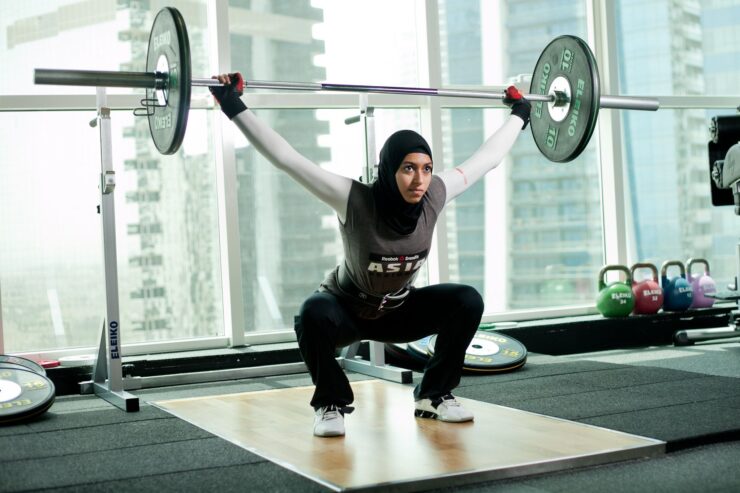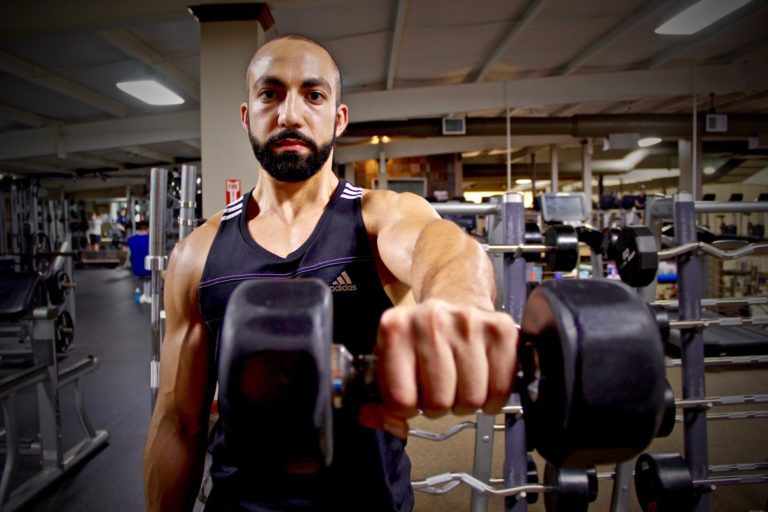It’s a dilemma faced by many Muslims every year. Omar Shahid breaks down how you can both fast and exercise.
Going to the gym on an empty stomach, without any water and slightly sleep-deprived during the long summer days of July may seem a little loony. Yet all across the world, many Muslims choose to do this. On the first day of Ramadan, my friend and I went to the gym, naively thinking we’d be the only Muslims there. How wrong we were.
Ramadan is a month of abstinence, introspection and a time to capitalise on every precious moment, as the heavenly reward for acts of worship are multiplied. However, whether to fit in an hour or so at the gym, go for a run or in the case of professional football players and Olympic athletes, competitively participate in their respective sports, makes for a tough decision.

My fear during Ramadan – one that I’m sure is shared by many other Muslim men – is losing too much weight. At the same time, Muslim women fear the opposite: putting on weight – which can easily happen either by overeating or eating the wrong things during the month. Both my mum and wife, for example, might be seen as going a bit to the extreme. They go to Spin classes while fasting. Yes, Spin – that intense indoor cycling workout.
Amid the barrage of conflicting opinions on the issue, here are some tips that fitness experts more or less agree on.
Should I go?
There is no right or wrong answer. It largely depends on how you feel and how in tune you are with your body. Dr Joseph Mercola, a popular health activist, urges us to use “common sense” in these situations.[i] Interestingly, a growing body of research suggests training while fasting has many health benefits.[ii] One example is that it’s a good way to shed fat.
If you really struggle with fasting, then perhaps it’s best to postpone your gym membership for a month. However, if one day you feel fresh, alert and energetic, go for it! (Just don’t overdo it.) Doing some light exercise when fasting is a good thing – it helps to keep the system working and blood circulating.

What time of the day should I exercise?
This largely depends on your daily routine. Sally al Awar, a clinical dietician based in Abu Dhabi, says you can “go for a walk or brisk walking before iftar”. Or, once you’ve had iftar, you can go for the more “strenuous exercise such as football or basketball” as long as you’ve already “restored water and glucose levels”.[iii] Rehan Jalali, a celebrity nutritionist based in California, believes weight training should be done after fasting, preferably just before suhur.[iv]
It’s important to find out what works best for you. You may find that you perform better doing weight training on an empty stomach, or that you feel more energised doing cardio after a light iftar meal.
- Do keep workouts short, about 30 minutes to a maximum of 60 minutes.
- Do light cardiovascular exercises – walking or cycling – to help burn calories and improve stamina, full body stretching to improve flexibility and detoxification, or mat exercises such as an abs workout and push-ups.
- Do drink plenty of water between the hours of iftar and suhur. Drink water with sea salt or coconut water to increase the electrolytes in your body, which are essential for heart, nerve and muscle functions.
- Do not do high intensity exercises like sprinting, stepper or heavy weight lifting (go for lighter than you would normally push) as it can cause joint or muscle injuries and also lead to complications such as low blood pressure, hypoglycaemia and dizziness.
- Do not continue training if you feel weak, dizzy or sick. Although you are training, lowering your usual exercise intensity is essential to staying fit and healthy.
- Do not eat lots of fried and fatty foods as it will counteract the good work you do at the gym.
A wise friend of mine from Canada tells me why he trains during Ramadan: “Ramadan is about disciplining the ego, so training during this month becomes more potent, since it takes much more discipline to train while fasting.”

Some train for spiritual reasons (as exercise can be a form of worship), while others train to keep fit, stay healthy and maintain a good weight. Whatever the case, Muslims should remember the ultimate goal of Ramadan: it’s a limited number of powerful days to gain proximity to God.
The holy month is all about training. So for those who are able to do it safely, exercise – in moderation – is a good habit to include in your Ramadan.
[i] Dr Joseph Mercola, ‘Should you eat before exercise?’, Peak Fitness, 13 Sep 2013, available here
[ii] Jill Leckey, ‘Fasted training: should you eat before exercise?’, The Guardian, 19 Sep 2013, available here
[iii] Zahraa al Khalisi, ‘Gym hazards during Ramadan’, The National, 6 Sep 2009, available here
[iv] Rehan Jalali, ‘The Ramadan nutrition and workout plan for success: women and men’, SuhaibWebb, 3 Aug 2010, available here
